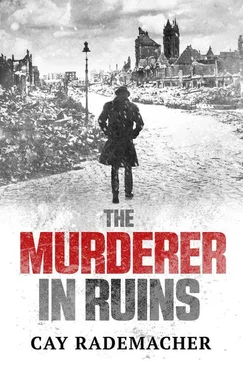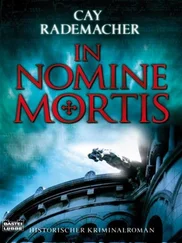Cay Rademacher - The Murderer in Ruins
Здесь есть возможность читать онлайн «Cay Rademacher - The Murderer in Ruins» весь текст электронной книги совершенно бесплатно (целиком полную версию без сокращений). В некоторых случаях можно слушать аудио, скачать через торрент в формате fb2 и присутствует краткое содержание. Год выпуска: 2015, ISBN: 2015, Издательство: Arcadia Books Limited, Жанр: Триллер, на английском языке. Описание произведения, (предисловие) а так же отзывы посетителей доступны на портале библиотеки ЛибКат.
- Название:The Murderer in Ruins
- Автор:
- Издательство:Arcadia Books Limited
- Жанр:
- Год:2015
- ISBN:9781910050750
- Рейтинг книги:5 / 5. Голосов: 1
-
Избранное:Добавить в избранное
- Отзывы:
-
Ваша оценка:
- 100
- 1
- 2
- 3
- 4
- 5
The Murderer in Ruins: краткое содержание, описание и аннотация
Предлагаем к чтению аннотацию, описание, краткое содержание или предисловие (зависит от того, что написал сам автор книги «The Murderer in Ruins»). Если вы не нашли необходимую информацию о книге — напишите в комментариях, мы постараемся отыскать её.
The Murderer in Ruins — читать онлайн бесплатно полную книгу (весь текст) целиком
Ниже представлен текст книги, разбитый по страницам. Система сохранения места последней прочитанной страницы, позволяет с удобством читать онлайн бесплатно книгу «The Murderer in Ruins», без необходимости каждый раз заново искать на чём Вы остановились. Поставьте закладку, и сможете в любой момент перейти на страницу, на которой закончили чтение.
Интервал:
Закладка:
Stave felt queasy for the first time. ‘An embryo?’ he wheezed.
‘No, a tumour,’ Czrisini replied.
‘Cancer?’
‘Whether it’s benign or malignant, I can’t tell easily. But it hardly makes any difference, does it?’
The chief inspector had pulled himself to. ‘Could she have had children?’
The pathologist stared long and hard at the corpse’s largely eviscerated abdomen, then at the organs he had removed, lying in the steel receptacles. Then he shook his head.
‘I doubt it. This woman has growths and deformations in her abdomen and probably had for some time. That is probably why the left fallopian tube was removed. The one on the right is also abnormal. And then there’s that tumour in her ovary. In any case there are no indications of a successful birth, no old vaginal scars. No, I would put money on her being childless.’
‘When did this woman have her operation?’
‘Hard to say. The scars are completely healed. Not in the last 12 months. But probably within the last ten years. Before that she would have been exceptionally young for an invasive procedure such as this.’
‘Between 1937 and 1946. In a private surgery?’
Czrisini gave him a surprised look and shook his head. ‘No, if it was all done properly it would have been in a hospital with a surgical ward.’
‘Did many hospitals in the Reich carry out operations of this nature?’
‘In the whole of the Reich? Hundreds.’
‘Pity.’
Stave followed the rest of the autopsy in silence. There was nothing more that might have been of any use to him.
A man who was the only other victim to have been beaten defending himself; a woman who might have been the mother of the child. What had cropped up in Burger-Prinz’s practice the other day as an elegant family drama hypothesis had been ripped asunder by the pathologist’s scalpel like some rotten internal organ. The woman lying on the dissecting table had never had children. And in all probability, she too had been beaten by the murderer prior to being strangled.
So, what was he left with? Four victims, all probably killed on the same day. Two medallions. The result of the autopsy. This woman was well-to-do. The earring shaped like a starfish. Delicate hands, not those of a manual worker. Nor were those of the old man, or the younger woman. That was too much of a coincidence to be chance, the chief inspector thought. All four victims belonged together.
Did the operation give him any other lead? If the dead woman wasn’t from Hamburg – and nobody here had identified her – then where might the operation have been carried out. In the east? Konigsberg? In the decimated capital, Berlin? It could have been anywhere from Flensburg to Garmisch. Who might remember her? Where might the surgeon live – if he was still alive, which in the circumstances was probably unlikely.
‘I’ll send you a report,’ Czrisini said, washing his hands.
‘Please send me copies of the other three autopsies too,’ Stave said, ignoring the stare of the assistant.
‘Sorry I brought you with me,’ he said to Maschke outside the door of the institute. The vice squad man had been leaning against a wall, smoking, his face still pale and the hand holding the Lucky Strike still shaking slightly. ‘I thought you would be interested in this part of working with the murder squad.’
‘I’d prefer to stick with my ladies of the night,’ Maschke said, not sounding in the least sarcastic.
MacDonald turned up in Stave’s office at the agreed time. The lieutenant was pale-faced and shifty-looking. He avoided Erna Berg’s eyes. And barely glanced at Stave. He was as nervous as a cat on a hot tin roof.
‘Should I put up a notice saying, “Out of bounds for German civilians”?’ the chief inspector muttered.
MacDonald stared at him in irritation for a second, as if he’d just been wakened from a dream, then shook his head apologetically.
‘We don’t even notice things like that, I’m afraid,’ he said glibly. ‘It’s old colonial tradition. Don’t let it get to you, old boy.’
‘Barriers are still barriers, and I’m no coolie,’ Stave replied.
‘Nonetheless a sign like that is honest and open,’ the lieutenant came back at him, with unexpected seriousness. ‘I can assure you that in England we have worse barriers. Often invisible, retrospective barriers – Oxford, certain clubs, the officers’ lounge. They somehow manage to make people ashamed of their background, their own family, their own name.’
Stave thought of his own, not exactly glorious career in the police. There had been trouble with the Nazis. Had he ever felt ashamed of his own background? Had he ever been shown the door because he had been born into the wrong family? He wondered what secret battles MacDonald had had to fight to get where he was today.
‘I’ve got nothing against your family name,’ he said.
‘You even manage to pronounce it properly,’ the lieutenant said with a smile. Stave smiled too. Does no harm to be up to speed at times, he thought but didn’t say.
Maschke came in. Following the autopsy, Stave had told him to take a break but he seemed to have recovered. We’ll get this done, between the three of us, the inspector thought to himself.
He closed the office door and went over the results of the autopsy. He had sent a photo of the earring to Department S but had had nothing back from them. The other earring had not turned up on the black market yet. An officer had gone round every jeweller in the city that had reopened. Nothing. And nobody remembered having made anything like it. Stave didn’t mention his visit to Burger-Prinz the previous day.
‘Anybody got any new ideas?’ he asked at the end.
‘We could send the photos and descriptions of the three adult victims to every CID department in all former parts of the Reich, or at least those where there are CID departments. Maybe one of them is not just a victim, but was also investigated by the police,’ Maschke suggested.
Stave nodded, annoyed with himself. It was a simple idea, he should have thought of it himself. It’s gradually getting on top of me, he thought. At least Maschke was still on the ball. ‘We should assume that they were all members of one family, a well-to-do family and not from Hamburg.’
The three of them talked it over, although actually only two of them said anything. MacDonald just stared blankly out of the window. For Stave the discussion was more or less deja vu because it was almost identical to the conversation he’d had with the psychologist. Except that this time there was no suggestion that the older of the two women might have been the child’s mother.
‘If this is all based on some domestic thing, then we’re not likely to get any further as to the motives without some sort of lead,’ Maschke concluded. He sounded weary. ‘If somebody got mad at Daddy because he took his toy scooter away and as a result decided to exterminate the entire family, how likely are we to find that out? Or if some perverted old uncle attacks his niece? Or if some long-suffering housewife just decided to bump off all her relations? Any of those could be motive enough, but nobody might know anything about it. We don’t have anything to go on.’
‘Maybe it has something to do with an inheritance,’ Stave suggested. The idea had just occurred to him: ‘Somebody killing off the rest of the family so he alone can inherit? All the victims were well fed, so they weren’t poor. That means there was something worth inheriting. There have always been people willing to murder for money. These days it might not be greed but need that prompts somebody to speed up their inheritance. A couple of old medallions or paintings to sell on the black market. For some people that could mean the difference between freezing to death or not. Starving or not. Although I don’t think it’s very probable given that the victims were stripped naked. Would somebody killing for an inheritance do that? Still, it’s an avenue worth exploring.’
Читать дальшеИнтервал:
Закладка:
Похожие книги на «The Murderer in Ruins»
Представляем Вашему вниманию похожие книги на «The Murderer in Ruins» списком для выбора. Мы отобрали схожую по названию и смыслу литературу в надежде предоставить читателям больше вариантов отыскать новые, интересные, ещё непрочитанные произведения.
Обсуждение, отзывы о книге «The Murderer in Ruins» и просто собственные мнения читателей. Оставьте ваши комментарии, напишите, что Вы думаете о произведении, его смысле или главных героях. Укажите что конкретно понравилось, а что нет, и почему Вы так считаете.











